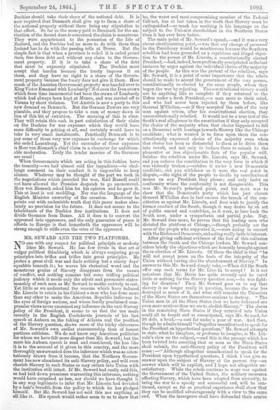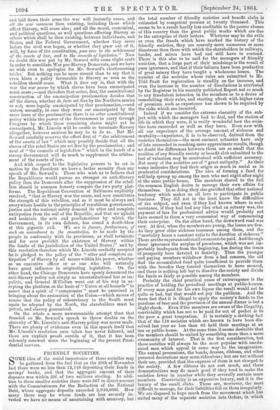MR. SEWARD AND THE TWO PLATFORMS.
NO one with any respect for political principle or modesty likes Mr. Seward. He has few rivals in that art of vulgar political thimblerig, which is always conjuring great principles into trifles and trifles into great principles. He probes a great civil war and finds nothing but a ninety days' squabble beneath it ; he waves his rhetorical wand and the monstrous genius of Slavery disappears from the causes of conflict, and nothing remains but some trifling political jealousy which it needs only the adroit and persuasive states. manship of such men as Mr. Seward to soothe entirely to rest. Yet little as we understand the reasons which have induced Mr. Lincoln to retain in his Cabinet a man who has done more than any other to make the American Republic ludicrous in the eyes of foreign nations, and whose loudly proclaimed com- promise views never exercised any influence on the anti-Slavery policy of the President, it seems to us that the use made recently in the English Confederate journals of his last speech at Auburn on the taking of Atlanta and the position of the Slavery question, shows more of the tricky cleverness of Mr. Seward's own earlier statesmanship than of honest partizan criticism. We do not know any American politician for whom we have felt more disgust than Mr. Seward ; but the more his Auburn speech is read and considered, the less like it is to the account of it given in this country, and the more thoroughly unwarranted does the inference which was so osten- tatiously drawn from it become, that the Northern Govern- ment has now abandoned its anti-Slavery policy, and will even cherish Slavery in such States as may return into Union with the institution still intact. If Mr. Seward had really said this, or had laid down premisses warranting this inference, nothing would have surprised us less, nor should we have thought it in any way legitimate to infer that Mr. Lincoln had deviated by a hair's breadth from the policy to which he has pledged himself. But Mr. Seward has not said this nor anything at all like it. His speech would rather seem to us to show that he, the worst and most compromising member of the Federal CA:net, has at last taken in the truth that Slavery must be extinguished—so much less soothing is his language on the subject to the Unionist slaveholders in the Southern States than it has ever been before.
The main point of Mr. Seward's speech,—and it was a very clever electioneering point, —was that any change of personnel in the Presidency would be mischievous because the Southern rebellion had been grounded on a capricious and illegal objec- tion to the person of Mr. Lincoln, a constitutionally elected President, —had, indeed, been professedly precipitated in thelast instance by anger against the individual choice of the majority of the people. As this was the pretext of the rebellion, says Mr. Seward, it is a point of some importance that the rebels should be made to accept the government of the very person, constitutionally re-elected by the same people, whom they began the war by rejecting. The constitutional victory would not be anything like so complete if they returned to the Union under a fresh President, —a man more to their mind, and who had never been rejected by them before, like General M'Clellan,—as if they accepted the rule of the very man against whom, after his constitutional election, they unconstitutionally rebelled. It would not be a true test of the South's real allegiance to the constitution if they only accepted the choice of the majority when that choice happened to fall on a Democrat with leanings towards Slavery like the Chicago candidate ; what is wanted is to force upon them the con- stitutionally expressed choice of the majority even when that choice has been so distasteful to them as to drive them into revolt, and not only to induce them to submit to the pleasanter or less objectionable fiats of the popular will. Subdue the rebellion under Mr. Lincoln, says Mr. Seward, and you enforce the constitution in the very form in which it was violently broken ;—subdue it under a now Democratic candidate, and you withdraw as it were the real point in dispute,—the right of the people to decide by constitutional means on any President they please ; and only insist on conformity where the conformity is not disagreeable. This was Mr. Seward's principal point, and his next was to show that the Democratic party which has just chosen General M'Clellan does in fact excuse the breach of the con- stitution as against Mr. Lincoln, and does wish to justify the former conduct of the South, though it may desire by an act of public amend and contrition, as it were, to lure back the South now, under a sympathetic and partial yoke. Nay, Mr. Seward does more, ho proves that the leading men who dictated the platform at Chicago,—though probably not the mass of the people who supported it, —were acting in concert with the Richmond Democrats, and acting really in thoir interest. After giving sufficient evidence of the fact of this collusion between the South and the Chicago leaders, Mr. Seward con- siders briefly the objections which are honestly brought against the re-election of Mr. Lincoln. Of these the chief is that " he will not accept peace on the basis of the integrity of the Union without having also the abandonment of Slavery." In answer to this Mr. Seward simply asks,—When did the South offer any such terms for Mr. Lincoln to accept ? Is it not notorious that Mr. Davis has quite recently said he cared little or nothing for the Slavery question now,—ho was fight- ing for disunion ? Then Mr. Seward goes on to say that slavery is no longer really in question, because the war has destroyed so much of it, and what still remains the Unionists of the Slave States are themselves anxious to destroy. " The Union men in all the Slave States that we have delivered are even more anxious than we are to abolish Slavery." The slaves in the remaining Slave States if they returned into Union could all be bought and so emancipated, says Mr. Seward, for- 50 dols. a head,—a cost far under a year of war. And then, though he admits himself "altogether unauthorized to speak for the President on hypothetical questions," Mr. Seward attempts to state what he imagines, or professes to imagine, is Mr. Lin- coln's view on the subject, —and this is the passage which has been twisted into asserting that so soon as the Slave States shall submit, the anti-Slavery policy of the President will cease :—" Although altogether unauthorized to speak for the President upon hypothetical questions, I think I can give an answer upon the subject of Slavery at the present day—an answer which will be explicit, and I hope not altogether un- satisfactory. While the rebels continuo to wage war against the Government of the United States, the military measures affecting Slavery, which have been adopted from necessity, to bring the war to a speedy and successful end, will be con- tinued, except so far as practical experience shall show that they can be modified advantageously with a view to the same end. When the insurgents shall have disbanded their armies at this gigantic evil. We are in favour, furthermore, of easy. At first, when the members are young, the losses are few. stmh an amendment to the constitution, to be made by the As they grow older sickness increases among them, and the people in conformity with its provisions, as shall terminate "mortality bears a constant ratio to the duration of sickness." and for ever prohibit the existence of Slavery within There arethe superannuation allowances tobe paid. And through the limits of the jurisdiction of the 'United States ;" and by sheer ignorance the surplus of premiums, which was not im- this resolution therefore which Mr. Lincoln cordially accepted probably inadequate from the beginning, has during the times he is pledged to the policy of the " utter and complete ex- of prosperity been devoted to festivity. Then the younger tirpation ' of Slavery by all means within his power, whether and paying members withdraw from a bad concern, the old as an executive officer or as one who will naturally find the accumulated fund quite insufficient to provide them have great influence in originating legislation. On the with the benefits they fancied themselves to have secured, other hand, the Chicago Democrats have openly denounced the and there is nothing left but to dissolve the society and divide anti-Slavery policy not simply as unconstitutional but as im- the funds as fairly as possible among the members. politic, and General M'Clellan went out of his way in ac- Probably the chief practical cause of extravagance is the cepting the platform on the basis of "Union at all hazards" to practice of holding the periodical meetings at public-houses. assert that a spirit of " compromise " must be exercised in If every man paid for his own liquor the result would not be bringing about the restoration of the Union—which means of quite so bad, but that would not pay the publican. And the course that the policy of subserviency to the South must mere fact that it is illegal to apply the society's funds to the again be adopted by the North, the slaveholders must be purchase of beer and the provision of the annual dinner is but a petted, and slavery guaranteed. slight check. Even if the members are aware of the illegality, On the whole a more unwarrantable attempt than that conviviality which has not to be paid for out of pocket is to founded on Mr. Seward's speech to throw doubts on the the poor a great temptation. It is certainly a striking fact sincerity of Mr. Lincoln's anti-Slavery policy was never made. that of the 118 societies which are known to have been dis- There are plenty of evidences even in this speech itself that solved last year no less than 85 held their meetings at an Mr. Lincoln's resolution once taken has never faltered, and inn or public-house. At the same time it seems desirable that there are explicit proofs outside of it, that it has been the members should be united by something more than a mere solemnly renewed since the beginning of the present Presi- community of interest. That is the first consideration, but dential canvass. those societies will always be the most popular with unedu-































 Previous page
Previous page